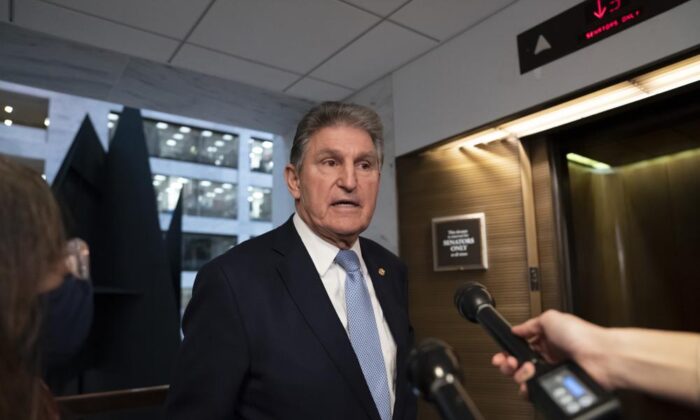By Joseph Lord
Sen. Joe Manchin (D-W. Va.) says he is opposed to Majority Leader Chuck Schumer’s (D-N.Y.) proposal to change Senate rules in order to pass legislation that would federalize elections, striking another blow to Democratic aspirations to overrule tightened election measures in state houses across the nation.
In a statement released to his Twitter on Monday, Schumer attempted to tie GOP opposition to federal election bills to the Jan. 6 “domestic extremists” who, Schumer contended, tried to “destroy our Republic.”
“Domestic violent extremists sought to inflict chaos and violence. Fueled by conspiracy and the ravings of a vengeful former President, they sought to destroy our Republic,” Schumer told his Senate Democratic colleagues in a Jan. 3 Dear Colleague letter.
Hoping to bypass the opposition of all 50 GOP senators to the bill, Schumer proposed that Democrats should use the “nuclear option,” which in U.S. legislative parlance describes a pathway to change Senate rules with a simple majority vote, in order to advance election legislation.
“I’ve always been for rules being done the way we’ve always done,” Manchin said when asked about Schumer’s proposal. “Being open to a rules change that would create a nuclear option, it’s very, very difficult.”
“Any time there’s a carve out, you eat the whole turkey,” Manchin quipped, referencing potential dangers that could come from liberally using the nuclear option. “The Senate as it has operated for 232 years [is an] extremely, extremely high bar that we must be very careful [before crossing],” Manchin argued.
Manchin also said that he preferred that any election legislation or rule changes should be acceptable to both Republicans and Democrats, and indicated that a bipartisan solution to the concerns of both Republicans and Democrats could be found.
Manchin’s opposition to the proposal is unsurprising.
Following the results of the 2020 election, when it was clear that Democrats would just squeak by to win the Senate, Manchin took to Fox News, where he promised viewers that he would defend the filibuster and would oppose any Democratic partisan effort to neuter the system.
Over the course of 2021, Democrats suggested changing the filibuster to pass election bills several times, but Manchin has said consistently that he would not support any major rule change. During the debt ceiling crisis, which posed a far more immediate risk to the nation, Manchin again rejected any major rule change to raise the debt ceiling.
After the 2020 election left millions of Americans concerned over the integrity of U.S. elections, state houses across the nation began to pass laws to tighten election integrity. Though these laws have taken different forms across different states, several measures have in common provisions to require or tighten voter ID laws, to limit absentee balloting, and other measures designed to ensure that only eligible citizens vote.
Since they took power in the 117th Congress, Democrats have persistently sought to pass wide-reaching legislation to counter these laws, which they have decried as a “new Jim Crow,” claiming that the bills are designed to disproportionately affect minorities.
In Brnovich v. Democratic National Convention (DNC), the Supreme Court heard arguments from the DNC to this effect: The DNC claimed that Arizona’s tightened voter laws, including restrictions on absentee balloting and other measures, constituted illegal discrimination under the 1965 Voting Rights Act; Arizona Attorney General Mark Brnovich protested this claim.
Ultimately, the court sided with Brnovich, ruling that the most common election integrity measures do not disproportionately affect minorities.
Read More From The PatriotAmerican
Still, Democrats have tried on several occasions to bypass the Supreme Court’s ruling and the will of state houses across the nation with wide-ranging election bills that would effectively give the federal government control over elections.
Despite several proposals and suggested compromise bills, GOP senators have staunchly opposed legislation that would take control over elections away from states, and have backed up these concerns by filibustering several different election bills.
Now that Manchin has come out against the proposal, there is little hope that Democrats’ newest scheme to federalize elections will come to fruition.

